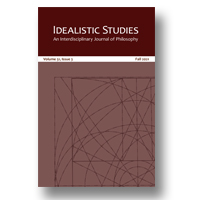|
articles |
|
1.
|
Idealistic Studies:
Volume >
53 >
Issue: 3
Kyle J. Barbour
The Hegelian Heritage of Bradley’s Degrees of Truth and Reality
abstract |
view |
rights & permissions
| cited by
In this essay, I argue that F.H. Bradley’s controversial theory of “degrees of truth and reality” is the logical development of Hegel’s own theory of truth when it is placed within the metaphysical system of the Science of Logic. Despite Bradley’s own claim that with regards to the theory of degrees of truth and reality he is indebted even more than anywhere else to Hegel, this connection has been little examined in the secondary literature. Through a careful examination of both Bradley’s works and the structure of Hegel’s logic, it will become clear that Bradley’s development of the theory is the only logical conclusion that the consistent Hegelian can make. This essay has clear ramifications for our understanding of Bradley’s philosophy and, through uncovering the logical connections that led Bradley to develop the theory, I reveal an important implication of Hegel’s thought that has been entirely overlooked.
|
|
|
|
|
2.
|
Idealistic Studies:
Volume >
53 >
Issue: 3
Paul T. Wilford, Samuel A. Stoner
Arendt’s Kantian Existentialism and the Political Significance of Jesus of Nazareth
abstract |
view |
rights & permissions
| cited by
Despite her emphasis on politics, Hannah Arendt’s account of the existential grounds of action in The Human Condition culminates in a discussion of Jesus of Nazareth that emphasizes the significance of forgiveness for grasping the radicality of human freedom. This essay investigates Jesus’s role in Arendt’s thought by excavating and explicating the premises that undergird her account of Jesus’s political significance. It argues that Arendt’s innovative approach to politics is complemented by a comparably innovative conception of human agency and shows how Arendt’s defense of the autonomy of the political rests on a novel metaphysics of action—a ‘Kantian existentialism’—that underlies and explains her account of Jesus’s political significance.
|
|
|
|
|
3.
|
Idealistic Studies:
Volume >
53 >
Issue: 3
Andree Hahmann
Hegel’s Return to Leibniz? The Fate of Rationalist Ontology after Kant
abstract |
view |
rights & permissions
| cited by
This paper examines the development of the modern concept of substance from Leibniz to Hegel. I will focus primarily on the problem of the inner and outer nature of substance. I will show that if one considers Hegel’s discussion of substance against the background of the controversy between Leibniz and Kant about the inner and outer nature of substance, it becomes clear that for Hegel both Leibniz and Kant grasped the whole concept of substance only partially and in its abstract moments. This is because they both concentrate on one aspect of substance and absolutize it. Hegel, on the other hand, not only overcomes the fundamental difference between the inner and outer of substance, but also develops the connection between the different moments of substance, causality and interaction from the rationalist concept of substance itself.
|
|
|
|
|
book review essay |
|
4.
|
Idealistic Studies:
Volume >
53 >
Issue: 3
Thomas J. Cantone
On the Purpose of Purposiveness:
Reading Ido Geiger’s Kant and the Claims of the Empirical World
view |
rights & permissions
| cited by
|
|
|
|
|
book reviews |
|
5.
|
Idealistic Studies:
Volume >
53 >
Issue: 3
Michael J. Monahan
Biko Mandela Gray and Ryan J. Johnson. Phenomenology of Black Spirit
view |
rights & permissions
| cited by
|
|
|
|
|
6.
|
Idealistic Studies:
Volume >
53 >
Issue: 3
Kelly Swope
Timothy L. Brownlee. Recognition and the Self in Hegel’s Phenomenology of Spirit
view |
rights & permissions
| cited by
|
|
|
|
